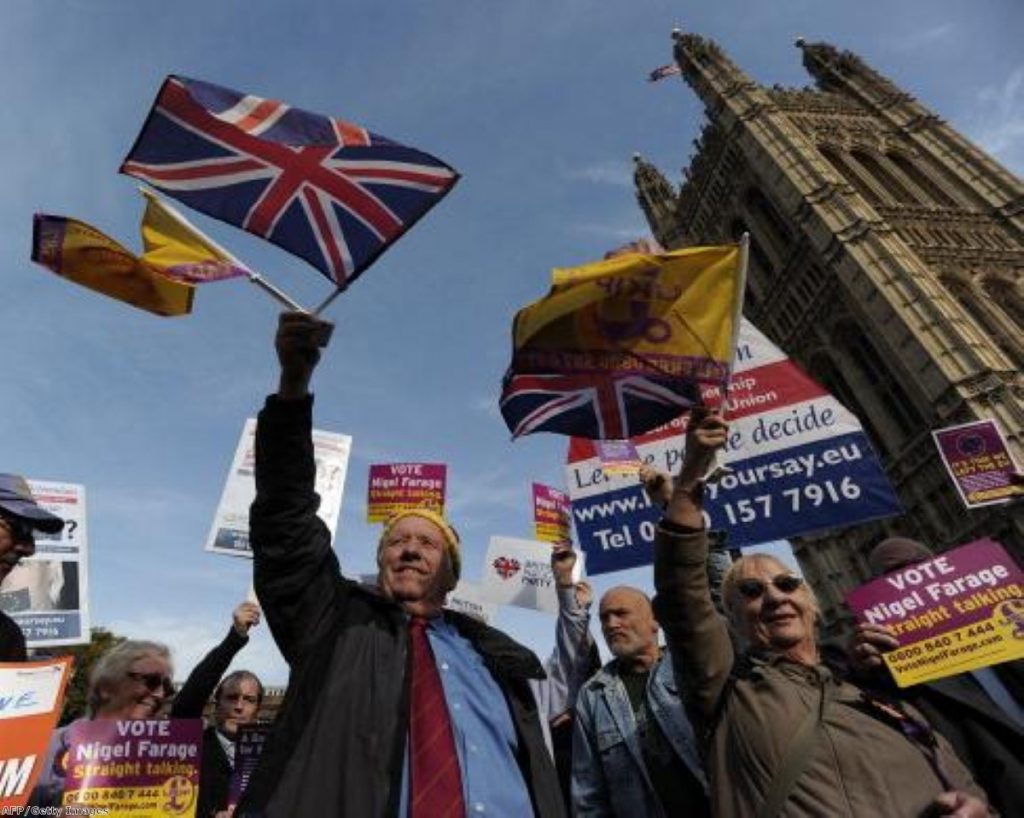Aftermath: PM struggles to smooth over EU infighting
By Alex Stevenson Follow @alex__stevenson
David Cameron sought to draw a line under yesterday's EU rebellion after coalition and Conservative divisions appeared to be widening.
The prime minister suffered a major blow to his authority last night when 81 Tory backbenchers defied a three-line whip to vote against the government.
The full scale of the pressure exerted on some wavering backbenchers was reflected in unconfirmed reports circulating around Westminster on Tuesday that chancellor George Osborne had been told to "f*** off" by one backbencher, Andrea Leadsom.
Mr Cameron insisted there was no "bad blood" after the vote, however.
"There's no, on my part, no bad blood, no rancour, no bitterness," he insisted.
"These are valued Conservative colleagues. I understand why people feel strongly and we will go forward together and tackle the difficult decisions the country faces."
His attempt to move on from yesterday's controversies were not assisted by comments from Nick Clegg, however. The deputy prime minister criticised Tory rebels for "tilting at windmills" as they sought to secure a public vote on Britain's ongoing involvement in Europe.
"You don't change Europe by launching some smash-and-grab dawn raid on Brussels," he said.
"You do it by setting out the case for changes and then arguing the case with other countries.
"We can't do this on our own – we have to build alliances, we have to convince and persuade other countries, and that is what we look to do all the time."
Downing Street remained defiant by pointing out that the Commons had overwhelmingly defeated the motion calling for a referendum on Britain's involvement in Europe, which was rejected by 483 votes to 111.
Those 111 votes included 79 Tories as well as two 'tellers', however, meaning the vote was the biggest ever rebellion by Tory backbenchers on Europe. The previous largest rebellion suffered by David Cameron was 41 MPs last December.
Philip Cowley and Mark Stuart of Nottingham University wrote on their Bullets and Ballots blog: "Because it outstrips the Labour Euro rebellion that occurred in January 1978, it is also the largest European rebellion by members of any party since the war.
"Indeed, as someone pointed out last night, there weren't an awful lot of Euro rebellions before the war, so we could just as easily say: this was the largest rebellion by members of any political party over Europe since dinosaurs ruled the earth."
EU referendum debate as it happened
David Nuttall, the MP who tabled the motion which led to yesterday's debate, said the scale of the revolt was a "creditable result". In Westminster the vote is being seen as a triumph for the Conservative right.
John Redwood wrote on his blog: "The heart of the Conservative party is Eurosceptic. Last night more showed their heart."
Sketch: The Great EU Referendum Rebellion
Yesterday's debate was punctuated by complaints about the debate from rebels, which was being held in backbench-controlled Commons time, being "hectored" by the government's whipping operation.
"We understand that many people who voted for it felt very strongly – and we respect that," a spokesman for the prime minister said.
"However, the government has to do what is in the national interest. The easy thing to do would have been for us to have avoided expressing a view. It was important to take a strong lead – because Britain's best interests are served by being in the EU.
"The PM has made clear that he shares the yearning for fundamental reform of the EU and is determined to achieve that."
Some commentators have suggested Mr Cameron's personal authority has been severely damaged by the defeat, which could embolden those on the right of the party who have previously expressed private frustrations with the coalition.
Education secretary Michael Gove claimed the Tory party was now united behind a renegotiation of Britain's links with Europe, however.
"It was a very precisely worded motion which allowed a number of people like myself, who are passionate eurosceptics, to say look, I disagree with the tactics but we agree on the ultimate goal," he told the Today programme.
"If you have a disagreement about tactics … and if you have that disagreement conducted with cordiality and good manners on all sides then I don't think it leads to the sorts of convulsions that many people want it to."
Shadow foreign secretary Douglas Alexander said he was baffled by the contradictory statements being issued by Cabinet ministers.
"The public deserves better than a government turning inwards and fighting with each other instead of fighting for British jobs, British investment and British growth," he commented.
"This spectacle of an out-of-touch and divided government is undermining the influence Britain has at the European negotiating table which is bad news for millions of British people who desperately want to see a proper plan for growth and jobs."
Two ministerial aides, Stewart Jackson and Adam Holloway, voted against the government in yesterday's vote, and are thought to have lost their jobs as a result. There was confusion this morning, however, as the prime minister's spokesperson issued contradictory statements about their status.





-01.png)